PODCAST: Iranian insider likely to be behind the killing of Hamas leader
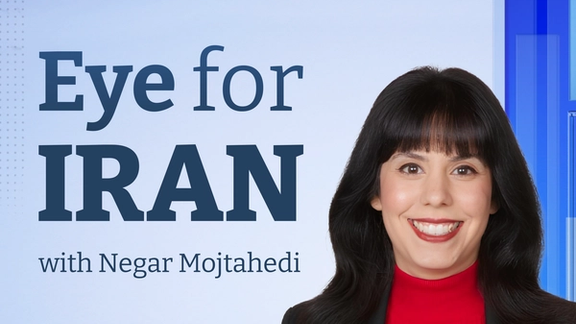
An Australian-British academic who was falsely imprisoned in Iran under espionage charges said the hit on Hamas leader Ismail Haniyeh likely came from an Iranian insider.

An Australian-British academic who was falsely imprisoned in Iran under espionage charges said the hit on Hamas leader Ismail Haniyeh likely came from an Iranian insider.
After attending a conference she was invited to in the Islamic Republic of Iran in 2018, Dr. Kylie Moore-Gilbert was arrested by the intelligence arm of the Islamic Revolutionary Guard Corps and eventually sentenced to 10 years in prison on charges of espionage.
Two years later, she was released in exchange for three convicted Iranian terrorists connected to a bomb plot in Bangkok in 2012.
During her time in Iran's notorious Evin prison she learned to speak Farsi and came into contact with high-level IRGC and state officials.
On this week's episode of 'Eye for Iran', Moore- Gilbert opens up about her time in prison and explains why she believes there was likely an Iranian insider behind the suspected Israeli hit, as Iran reels in the wake of Ismail Haniyeh's assassination.
Speaking to host Negar Mojtahedi, Moore-Gilbert also shares what she learned about her captors and what that means about the state of mind of high ranking government officials in this week's episode of 'Eye for Iran.'
You can watch the entire episode on Iran International's YouTubePage or listen to it on Spotify, Apple or Amazon.

The morning Ismail Haniyeh was killed in Tehran felt eerily similar to the morning Qasem Soleimani was assassinated. We woke up, picked up our phones, and read the news in shock. We imagined the worst—war. The anxiety was there, but not as intense as the last time.
It was unclear what had caused Haniyeh’s death. “A projectile,” they said. But how? What type? From where? We didn’t know. We weren’t even sure where his residence was. Some said it was the Saadabad Palace, adding to the creeping anxiety. What if the Palace, a historic landmark, was damaged?
It was just too much. A friend wrote that he had diarrhea from the shock and stress. The fear of war looming –again. Not as intense as the fear we had when Soleimani was killed, but a gut-churning fear nevertheless.
The difference this time was that it wasn’t the first time. We had seen it before: the cries of retaliation, the promise of Harsh Revenge. Only in April, we felt we had to brace for a full-blown war after Israel hit Iran’s consulate in Syria. But the full-blown war never came. Missiles were launched; missiles were intercepted; and life went on as ‘normal’. The utter madness that is our normal in Iran.
So now, many Iranians simply joke away the bellicosity. It’s a defense mechanism that seems to work –until it doesn’t.
"Wars start with smaller clashes., with skirmishes. We all know that.” Masoud is 49 and works as a clerk for an organization half owned by the state. He thinks the younger generation should take the wisdom of his generation more seriously. “One side strikes, the other responds, and this tit-for-tat continues until it reaches a point where it can no longer be stopped. And that would be a dark day for all of us.” Those who remember the eight-year horror of the war with Iraq are often more cautious when discussing the prospect of another one. “I don’t like this regime either, but when I hear talks of an attack overthrowing the ‘system’ but not harming the people, I dread their naivety."

This may be a common line of argument among the older generation. But it’s by no means universal. In fact, some of the more radical voices you get to hear around you are that of the ‘fed-up’ elderly: pensioners like Mahmoud, who have “seen it all”, and cannot help letting out a Persian proverb every other sentence.
“Die once, mourn once,” he says, holding up his index finger to illustrate ‘once’. "We cannot go on forever with this government. It’s been oppressing us and destabilizing the region for years. We have no effective opposition. The only option left is to target their bases and erase them from the face of earth without harming civilians."
Few speak publicly in favor of foreign military intervention. But those few may now cite the “surgical elimination” of Haniyeh –as does Mahmoud– as “evidence” that the Islamic Republic can be “taken out cleanly”, and we should therefore not fear a Syria-fication of Iran. This, as far as I can tell, is still a minority, if not fringe, view. But it also looks as if the ‘targeted assassinations’ –from Soleimani to [Iran’s nuclear mastermind Mohsen] Fakhrizadeh, and now Haniyeh– may have emboldened a few more Iranians to casually call for such actions.
The day after Haniyeh was killed, I overheard a conversation in a grocery store that illustrates this sentiment brilliantly. A middle-aged woman was complaining about the constant rise of prices. "Forty thousand tomans [$0.70] for a 100gr pack of butter?” she exclaimed. “It’s gone up because of the killing [of Haniyeh]. It’ll go higher with the next one,” the grocer said. “The next one is the main one, God willing,” the woman replied. The grocer reminded her that such words could cause her trouble. There was no need to explain further. We all knew who she meant by the ‘main one’, a term used for Supreme Leader Ali Khamenei.
The assassination, like many other events, one has to admit, has led to a wave of conspiracy theories. “It's not that they can't kill Iran’s leaders, they don’t want to,” a friend said after I told her about the exchange in the grocery store. “They need the Islamic Republic to be there as the scarecrow of the region."
And then there are those who see the Haniyeh assassination as proof that Israel could have eliminated Hamas with much less civilian casualties if it wanted to. Sohrab, a graduate student in social sciences, is one such voice. “They killed ten of thousands in Gaza under the pretext that Hamas uses civilians as human shields, claiming they had no choice,” he says.. “But we just saw how easily they can hit their target without harming a single civilian. I think the killings in Gaza are more deliberate than they’d like to admit."
The past year or two has been crazy even by Iran’s standards. The current Iranian calendar year is not even past the halfway mark, and we’ve had a president killed in a helicopter crash and a top figure in the Axis of Resistance assassinated in Tehran. After Raisi’s death, the Persian social media turned into a river of jokes. That has not been the case this time. Perhaps because the former was an entirely domestic affair. No one feared a war to break out. This time, the drum beats are constant and loud. “The world will witness our power –and soon enough,” an official just said on the state TV.
Still –and as far as I can tell– few are as scared as they were when Soleimani was killed. But it’s tense. We’re all waiting to see how the Harsh Revenge pans out this time. Most concerned are those with tickets for air travel –and those whose loved ones are supposed to fly in for a long-anticipated, short summer vacation. This shouldn’t be the ‘normal’ life for anyone. It is here, though, and there’s very little we can do about it.

Iranian authorities have expelled Kobra Gholami, an outspoken Afghan social researcher, allegedly for failing to comply with the country's mandatory hijab regulations.
Reports indicate that, despite possessing valid residency documents, Gholami received multiple text message warnings regarding her hijab before being summoned to the passport office, where she was detained by Iranian police and deported within hours.
The people close to her contend that her expulsion lacked legal justification and that she was denied the opportunity to communicate with her family.
Her deportation has ignited a social media firestorm amid Iran's ongoing crackdown on women over mandatory hijab.
Users have launched a campaign with the hashtag "#BringBackKobra," voicing concerns about her fate in Taliban-controlled Afghanistan and advocating for her return to Iran.
Shima Va’ezi, an Iranian social media user, drew attention to Gholami's abrupt deportation on X, stating, "Kobra is now on the bus and hasn't had the chance to speak to or say goodbye to her family and loved ones. She possessed all the necessary residency documents and was pursuing a master's degree at Al-Zahra University."
On Thursday, Ameneh Zamani, a child rights activist briefly detained in 2022, wrote on her Instagram account that Gholami recently delivered a speech in Iran titled "Identity Formation of Migrant Women at the Intersection of Gender and Nationality."
Describing Gholami as a "strong and independent" woman, Zamani wrote: "All of us women dream of living in a world of freedom. Let's be Kobra’s voice! As Kobra said, 'Hope is the seed of our identity.'"
Last year, Gholami spoke at the sixth conference on Social-Cultural Research in Iran, under the theme "Femininity and Social-Cultural Transformation," in a panel titled "Afghan Migrant Women in the Cycle of Oppression," where she criticized the treatment of Afghan migrant women in Iran.
Afghans constitute the majority of immigrants in Iran, both legal and illegal, and are frequently labeled as "foreign nationals" by officials and the media. Currently, officials estimate the number of Afghan immigrants in Iran to be as high as 8 million.
International human rights organizations have recorded years of mistreatment of Afghan refugees and migrants in Iran as they continue to be deprived of many essential services, including healthcare, employment opportunities, and housing. However, a large influx since the 2021 takeover of the Taliban has led to some backlash by Iranians who say their country has multiple serious economic and social crises and cannot handle refugees.
According to Afghan authorities, Iran deported over 20,000 Afghan children last year, many of whom were unaccompanied and without guardians.
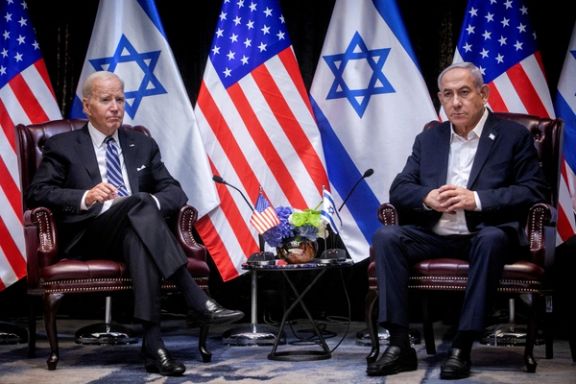
The US president has vowed to help Israel counter Iran’s looming attack but warned the Israeli prime minister not to count on US support if he escalates further and keeps Washington in the dark, as he did with the killing of a Hamas leader in Tehran.
Israel has kept its customary silence on the killing of Hamas leader Ismail Haniyeh, and Hezbollah commander Fuad Shukr who was killed in Beirut only a day before the Palestinian leader. It is believed, almost universally, however, that both assassinations were planned and executed by Israeli secret services.
According to an Axios report citing two US officials, President Joe Biden had a “tough” call with Prime Minister Benjamin Netanyahu on Thursday, where he vented his frustration from the fallout from Israel’s escalatory action, as his administration tries to broker a hostage and ceasefire deal between Israel and Hamas.
On Thursday, Iranian officials convened in Tehran with representatives from Iran-backed groups to discuss plans for what is said to be a joint mission against Israel, which they blame for the killing of Haniyeh and Shukr. Iran and its allies are preparing coordinated actions intended to “deter Israel while avoiding full-scale war," according to AFP.
This would be in line with Iran’s strategy in its last retaliatory action against Israel in April, where dozens of missiles and kamikaze drones were launched from Iran. Tehran telegraphed that strike in advance giving Israel, the US and their allies enough time to prepare and shoot down all but two of the missiles –which landed near a military base but left no casualties.
However, this time, it is not unclear whether Iran will give Israel and its allies that much time to prepare for any new round of major Iranian attacks, officials told The New York Times on Friday.
The Axios report seems to suggest that the Biden administration is mindful that the retaliatory cycle might become the ‘new normal’ and edge Israel and Iran closer to a full-blown war.
President Biden’s reported warning to Netanyahu comes amid parallel measures to bolster US military presence in the Middle East as well as support for its allies.
The US is “poised” to send more combat aircrafts to the Middle East, according to the New York Times report. However, the US lawmakers are not satisfied with the Biden administration's measures to protect Israel.
Earlier this week, two US lawmakers introduced a measure that would authorize the US government to give Israel ‘bunker buster’ bombs that can “take out” Iran’s underground nuclear facilities.
The bipartisan act, titled Bunker Busters Act, comes at a time of heightened tension between Iran and Israel, but seems to be unrelated to recent events, as it was introduced Tuesday, one day before Haniyeh was killed in Tehran. It seems to have gained more significance, however, amid reports of retaliation against Israel, “as early as this weekend.”
“We cannot sit silently while the ayatollah and his minions plot to wipe Israel off the map,” said Mast in a statement, “Israel must have the tools necessary to protect its people against Iranian aggression.” Gottheimer echoed Mast’s message. “While Iran and its terrorist proxies continue to wreak havoc and chaos around the world, we must ensure they can never threaten the US or our allies with a nuclear weapon.”
Currently, the Biden administration does not have the authority to give Israel a ‘bunker buster’ –or Massive Ordnance Penetrator (MOP). The bill, if passed and enacted, would provide congressional authorization for such a provision, pending the results of Pentagon study on whether this move serves US national security interests.
The MOP weighs around 13 tons, according to the US Air Force, and is intended to penetrate up to 200 feet underground before exploding.
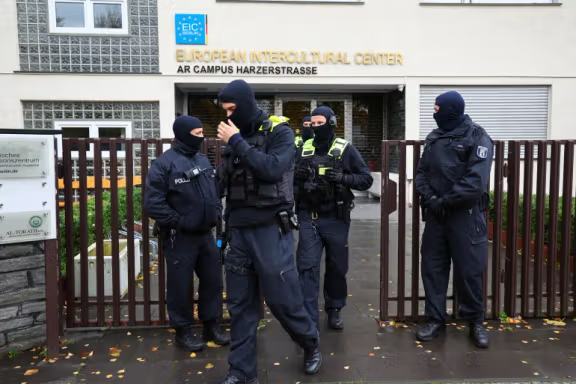
The German government deported the Iran-linked Imam of the Islamic Center in Berlin, Nasir Niknejad in late June, according to information obtained by Iran International's correspondent in Berlin.
According to these reports, Niknejad and his wife were detained at Berlin airport upon their return from a one-month leave, three weeks after the closure of Islamic centers affiliated with the Islamic Republic across Germany, and were subsequently deported back to Iran.
An Iran International source told our correspondent, Ahmad Samadi, that Niknejad became involved in a confrontation with airport police after realizing he was not permitted to enter Germany.
Previously, in November 2022, Soleiman Mousavifar, the deputy head of the Islamic Center of Hamburg, was expelled for supporting Hezbollah.
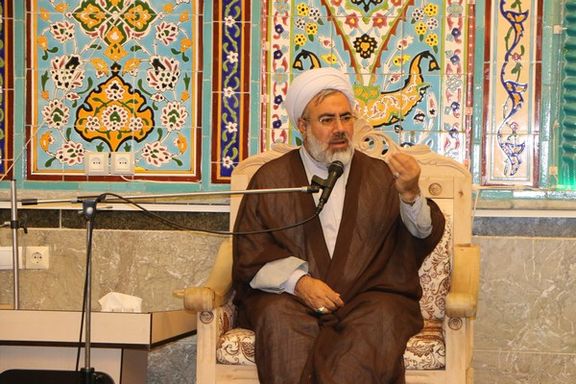
Germany shut down the Khamenei-controlled Islamic Center of Hamburg and Blue Mosque in July for its role in serving as a hub of terrorist ideology, antisemitism and anti-democratic threats to the Federal Republic’s constitution order, according to the interior ministry.
When asked the closure, a German interior ministry (BMI) spokesman, Lars Harmsen, told Iran International on Thursday that “In addition to the Islamisches Zentrum Hamburg, the BMI has also banned sub-organisations and confiscated their assets. These were the following: the Islamische Akademie Deutschland, the Verein der Förderer einer iranischen-islamischen Moschee in Hamburg, the Zentrum der Islamischen Kultur in Frankfurt (Main), the Islamische Vereinigung Bayern in Munich, and the Islamisches Zentrum Berlin.”
When asked by Iran International if the confiscated assets from Iran’s regime, the Islamic Center of Hamburg and Blue Mosque and other entities, will be used to provide compensation to the Iranian victims of terrorism in Germany, the spokesman said, "Concrete plans for a future usage of the Blue Mosque and other confiscated assets can only be made by the BMI once the ban is final. Therefore, the outcome of the administrative procedure remains to be seen.”
When questioned about future closures of other Iranian regime-linked and controlled centers, mosques and associations the BMI spokesman said, “In principle, the BMI does not comment on possible further bans, regardless of whether there is reason to consider them in individual cases or not…”
Meanwhile, Iranian-German dissidents are urging the German authorities to shutter additional organizations and mosques linked to the Islamic Republic of Iran. Dr. Kazem Moussavi, the spokesman for the Green Party of Iran in exile in Germany, told Iran International “The closure of the Islamic Center of Hamburg was long overdue and necessary. The closure came too late and is insufficient. Germany’s appeasement policies toward Iran’s regime continues. “
He urged that Germany to shut down the Islamic Republic’s embassy in Berlin and the regime-linked Al-Mustafa Institute in Berlin , as well as the pro-Khamenei Islamic Community of Shiite Communities. Moussavi termed the Iranian regime embassy and other Tehran-linked entities a “security risk” for Germany.
According to Moussavi, the Al-Mustafa Institute’s director was a long-time religious teacher from the banned IAD (Islamic Academy in Germany). The Al-Mustafa Institute in Berlin is part of the Al-Mustafa International University in Iran, where foreign recruits are being ideologically trained.
“The Al-Mustafa International University is the main institution for exporting the regime's ideology to the Islamic world, the West and Germany. It has over a hundred branches worldwide with more than 40,000 students,” said Moussavi.”
He added that the organization of Islamic Community of Shiite communities has more than 150 mosques and the director of the now-defunct Islamic Center of Hamburg is the chairman of the spiritual council of the Islamic Community of Shiite Communities.
Moussavi noted that the largely pro-Iran regime German Körber Foundation is Hamburg protects and supports Seyyed Hossein Mousavian, a former Tehran diplomat who currently is employed by Princeton university. Körber’s cooperation with him legitimizes his past activities, Mousavi argued.
The Iranian-German dissident, Mina Ahadi, who is leading the Alliance Against Islamic Regime of Iran Apologists (AAIRIA) campaign in Germany to compel Körber to pull the plug on its relations with Mousavian and Iran’s government, told Iran International Germany should close the Iranian regime’s “embassy and consulate and the Islamic Community of Shiite Communities.”
She added that Germany needs to sanction the Islamic Revolutionary Guard Corps.
Ahadi said there “must put more pressure” on the Körber Foundation.
“Körber must see that when it works together with the Islamic regime, they are making a fascist and anti-women government stronger,” she said.
Ahadi was pleased with the interior minister's decision to shutter the Islamic Center of Hamburg. She worked to secure the center's closure.
In 2023, German Iranians demanded that the German state government of Hesse shut down the pro-Iran regime Center for Islamic Culture in Frankfurt that honored IRGC's Qasem Soleimani.
Iran International reported, in May, on the growing pressure on Körber Foundation to sever ties with Mousavian and the Islamic Republic of Iran. In June, Iranian-Germans protested in front of Körber’s building in Hamburg.
Iranian activists in Germany say that Mousavian is "an extension of the antisemitic regime, acting as its loyal lobbyist in the US through the support of the Körber Foundation in Germany.”
When asked about the scandal-plagued Körber Foundation, the German interior ministry spokesman told Iran International "As a matter of principle, we do not comment on matters of public foundations. The Körber Foundation is not an object of observation of the Office for the Protection of the Constitution." Germany's domestic intelligence agency is called the Office for the Protection of the Constitution.
Multiple Iran International press queries sent to the Körber Foundation and its parent company, Körber AG, were not returned. Körber was founded by the former Nazi, Kurt Adolf Körber (1909-1992), who exploited concentration camp victims to advance the Holocaust and Adolf Hitler’s war goals.
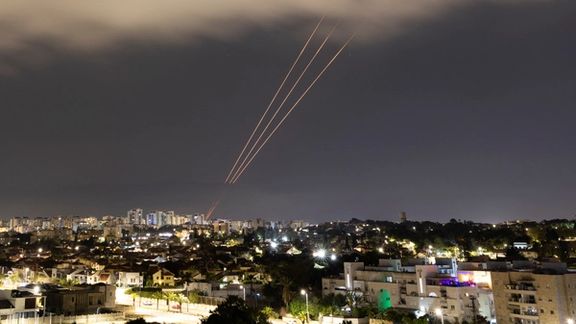
Reports suggest that Iran's response to the killing of Hamas leader Ismail Haniyeh in Tehran this week could involve multiple attacks by its proxies and Iran itself, possibly targeting civilians, as early as this weekend.
Retaliation is further fueled by the fact that, less than 24 hours before Haniyeh's assassination, Israel announced—and Hezbollah confirmed—the killing of Hezbollah's senior military commander, Fuad Shukr, in an Israeli airstrike on a Beirut suburb.
According to AFP, Iran and its allied armed groups are preparing coordinated actions intended to “deter Israel while avoiding full-scale war.”
On Wednesday, Iranian officials convened in Tehran with representatives from the "Axis of Resistance" — a collection of proxy forces financed and armed by Iran - to deliberate on retaliation.
A source close to the Lebanese group disclosed to AFP that two scenarios were discussed: a simultaneous response from Iran and militia groups, or a staggered reaction from each party. This source, who had been briefed on the meeting, requested anonymity due to the sensitive nature of the information.
Iran's Supreme Leader, Ali Khamenei, has threatened "harsh punishment" for Haniyeh's killing, which the group attributes to Israel, and has vowed revenge.
A leader of the Islamic Resistance of Iraq, a coalition of pro-Iran groups, informed AFP that "Iran will lead the initial response with the participation of Iraqi, Yemeni, and Syrian factions, targeting military objectives. This will be followed by a second wave of attacks from Hezbollah."
The source further indicated that Hezbollah might target civilians to avenge the deaths of three women and two children in the strike that killed Shukr in Beirut.
CNN, citing US officials, reported that the response might include attacks on US forces in Iraq and Syria by Iranian-backed proxy militias in the region. For months, these militias launched numerous attacks on US forces in the Middle East. Still, these largely subsided after the US retaliated to a drone attack that killed three US service members in Jordan in January. Officials suggest that Iran could instruct these groups to resume firing on US forces.
Israeli media outlet Ynet reported that Israelis are anticipating attacks as early as Saturday, following Haniyeh's funeral in Qatar on Friday. They are on high alert and preparing for a "broad attack" by Tehran and its proxies.
"The assumption is that a significant response could come from multiple fronts in the coming days, potentially coordinated by Iran with all its proxies: Hezbollah, the Houthis, and militias in Syria and Iraq," Ynet wrote on Thursday.